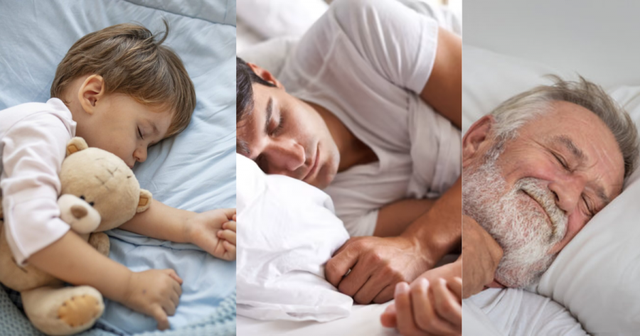

Sleep is not a luxury, but a biological necessity. As one of the essential pillars of physical and mental well-being, it affects brain function, strengthening the immune system, and long-term heart health.
But while the general recommendation for adults remains 7-9 hours a night, sleep needs vary significantly during different stages of life.
According to sleep experts, adults ages 18 to 60 need at least 7 hours of sleep a night to maintain optimal performance. For those ages 61 to 64, the ideal is 7 to 9 hours, while for those 65 and older, the recommendation drops to 7 to 8 hours. However, a common myth that older adults need less sleep is not supported by scientific research.
For 18-25 year olds, sleep is essential for memory, concentration and emotional stability. But the reality is often different: academic commitments, part-time work and social life limit hours of rest. A 2025 study found that almost half of young people experienced sleep problems during the pandemic, accompanied by high stress and anxiety.
Between the ages of 26 and 39, sleep is often sacrificed to keep up with the fast pace of family and professional life. In women, pregnancy and the postpartum period can lead to insomnia and even accelerate the aging process. Also, postpartum thyroiditis, a condition that affects 5-10% of women, can cause significant sleep disturbances.
In the workplace, lack of sleep has serious consequences: according to a 2022 study, sleep-deprived employees had less compliance with safety rules and a higher risk of accidents.
After age 40, the incidence of disorders such as sleep apnea increases, especially during menopause in women. This condition, which temporarily stops breathing during sleep, causes chronic fatigue and reduces quality of life. Experts recommend regular physical exercise, limiting alcohol, and ongoing medical monitoring to address these problems.
In old age, factors such as health problems, medications, as well as loneliness and social isolation, negatively affect sleep quality. Despite this, older people still need 7 to 8 hours of sleep, although efforts to maintain this routine are often challenged by reality./ iefimerida
Latest news



Dance with the mask of evil
2025-06-20 21:11:50
Matura 2025, Albanian Language and Literature exam grades published
2025-06-20 20:40:37
Tabaku: Albania has African wages and European prices
2025-06-20 20:33:02


UK temporarily withdraws embassy staff from Iran
2025-06-20 19:16:02
How Albania became the country with the highest cost of living
2025-06-20 18:49:11


Hail and strong storm "grab" Belshi
2025-06-20 17:35:56

School closures increase parents' financial burden during the summer
2025-06-20 16:49:19
KAS dismisses SP over vote revaluation
2025-06-20 16:34:02



Albanian language included in official communications of New York public schools
2025-06-20 15:08:35
Accident in Italy, 46-year-old Albanian dies (NAME)
2025-06-20 14:50:50
Kosovo in electricity crisis, KESCO appeals to citizens: Save electricity!
2025-06-20 14:29:55
Meta: Disinformation against me, a product of government propaganda!
2025-06-20 14:08:44
The American obsessed with Albania, a country he would write an anthem for
2025-06-20 13:39:41
Berisha: SPAK is throwing candy to protect Gys Agas and Rama!
2025-06-20 13:30:02
"Elections an electoral crime"/ Berisha warns of protests at home and abroad
2025-06-20 13:09:59


Reported missing a day ago, elderly man found dead in Peqin
2025-06-20 12:19:21
Drug gangs in Tirana cracked down, 24 arrested, 8 wanted (NAMES)
2025-06-20 11:57:38


You win the elections like Edi Rama - but justice won't allow you in Switzerland
2025-06-20 11:10:28
Bullets fired at Arjan Ndoji's former driver's bar, 15 shells at the scene
2025-06-20 10:48:02
Vokshi reports Vilma Nushi to SPAK, files lawsuit for "Check Up"
2025-06-20 10:31:54
Requests release from prison, hearing for former president Meta ends today
2025-06-20 10:15:50

Bullets fired at a bar in Fushë Krujë, police surround the area
2025-06-20 09:34:34



Foreign exchange, how much foreign currencies are bought and sold today
2025-06-20 08:40:20

Clear skies and cloudy skies, today's weather forecast
2025-06-20 08:00:26
Morning Post/ In 2 lines: What mattered yesterday in Albania
2025-06-20 07:50:05
Noka reveals Rama's condition for Veliaj to resign
2025-06-19 22:53:43
Vote recount in Tirana, Kaso: We did not have the 14th mandate as our objective
2025-06-19 22:44:53




Noka: Policemen were running from morning to night for SP votes
2025-06-19 21:31:03
The three zodiac signs that will be disappointed in love this month
2025-06-19 21:18:48
Accused of murder due to blood feud, 48-year-old arrested in England
2025-06-19 21:06:57
Vasili releases video: Tirana-Kashar segment full of gravel, no workers around!
2025-06-19 21:00:48

Tirana without a coach, four names considered for the white-and-blue bench
2025-06-19 20:21:12

Rinderpest/ A new outbreak appears in Shkodra, 200 sheep affected
2025-06-19 20:01:50

Scientists raise the alarm: Earth risks exceeding the 1.5°C warming limit!
2025-06-19 19:37:44

"Fiscal Peace" without consultation with the EU, Brussels concerned
2025-06-19 19:05:23
Trump signs executive order extending TikTok ban in US for another three months
2025-06-19 19:03:35

A special Task Force on immigration is established in cooperation with Italy
2025-06-19 18:23:58
Drug trafficking gang busted in Italy, 25 people arrested, including Albanians
2025-06-19 18:18:33
AMF denounces a suspicious cryptocurrency investment platform
2025-06-19 18:06:07


Technology as a tool of war between Israel and Iran
2025-06-19 17:27:54




EU divided over Israel's right to bomb Iran
2025-06-19 16:10:42

Analysis/ How is Russia spreading propaganda in the Albanian language?
2025-06-19 15:49:18
Session in the Criminal Court, MP Qani Xhafa is fined
2025-06-19 15:33:30
Members of criminal organizations! 3 Albanians extradited from Dubai today
2025-06-19 15:20:04

Lufta/ Zelenskyy bën thirrje për rritjen e presionit ndaj Rusisë
2025-06-19 14:56:02

Netanyahu warns Iran after attacks on Israeli hospital
2025-06-19 14:34:53

Attempted to enter Albania with false documents, 25-year-old arrested
2025-06-19 14:18:20
Psychology explains what happens in the brain of a person contemplating suicide
2025-06-19 14:01:25

These are the coldest zodiac signs
2025-06-19 13:45:18



Albanian man dies in hospital after accident in Italy
2025-06-19 13:02:45


Berisha to gather political leaders tomorrow
2025-06-19 12:32:23

Iran confirms meeting with representatives of Britain, Germany and France
2025-06-19 12:11:33


